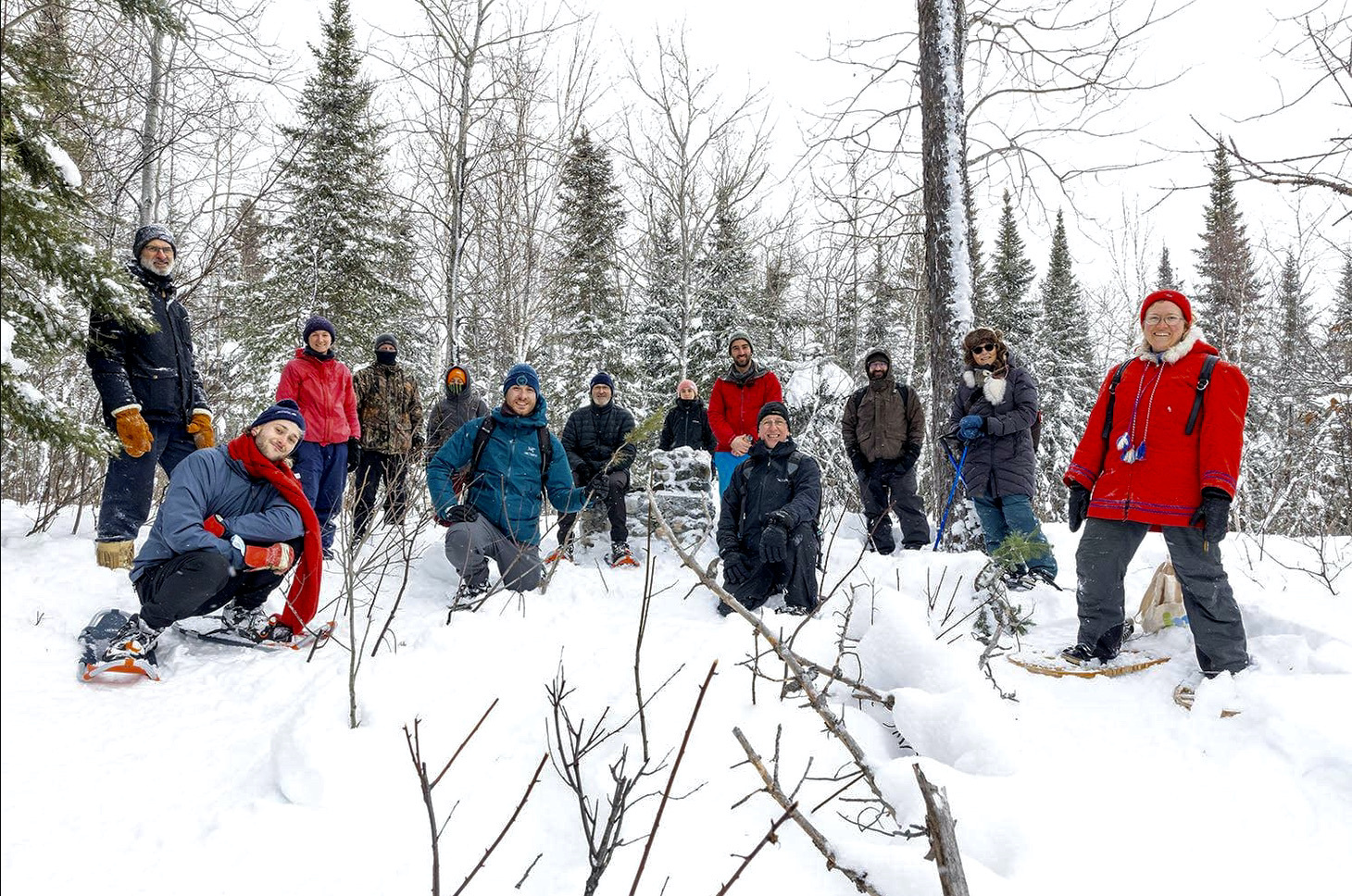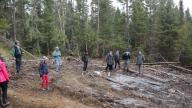(Anicinape Aki, La Motte, Abitibi, Quebec, Canada) Founded in March 2021, the Collectif des Pas du Lieu has tasked itself with a mission as simple as it is important: encourage people to hike in the public forests of Abitibi-Témiscamingue.
The meeting place is not random. In fact, the Collectif purposefully chooses to hike along trails directly on top of Sayona Mining’s claims for its Authier Lithium mine in the municipality of La Motte, in Abitibi-Témiscamingue, northern Quebec.
The end goal for the Collectif is clear: by inviting people to better appreciate the beauty and the fragility of the forest and esker threatened by the Authier Lithium project, they will take concrete action to protect the area.
To date, the Collectif has held a dozen hikes in all seasons, each gathering a few dozen hikers from all over the region.
Since the beginning of 2022, the Collectif has extended an open invitation to anyone interested in joining the collective hike on the first and third Sundays of every month. The trails range from beginner to intermediate levels, depending on the level of the group. The hikes are open to people of all ages and are particularly popular with young families. Already, people from ages 2 to 77 have participated.
The next hike will take place on Sunday, February 20th, starting at noon. Information for the meet up location is available on the Facebook event of the Collectif des Pas du Lieu.
A unique and vulnerable place
The area being threatened by the mine is of great importance and rare beauty. Sayona Mining’s planned open-pit mine is just a few dozen metres away from the Saint-Mathieu-Berry esker – one of the best sources of drinking water in the world. The esker is a natural filter formed when the glaciers retreated several millennia ago, and now houses an underground river with exceptionally pure water.
Government experts currently reviewing the company’s preliminary environmental assessments have described the site’s natural ecosystem as “rich and very rare in the region.”
A historic civil society movement beginning in 2018
The Collectif des Pas du Lieu is part of a broader movement that began four years ago to protect the Saint-Mathieu-Berry esker. A Radio-Canada article published on February 1, 2018 revealed for the first time the proximity between the esker and the Authier Lithium project – at that point, estimates situated the project at “less than 500 metres from the esker,” causing immediate indignation across the Abitibi population. Nine months later, however, the company finally released its own map showing the project’s closest facilities to the esker were, in fact, barely 20 metres from the esker.
The public was also enraged by the perception that Sayona Mining was trying to bypass rigorous environmental assessments. The company had deliberately designed its project to avoid being subjected to oversight of the Bureau d’audiences publiques sur l’environnement (BAPE Public Hearings Office). Sayona Mining intentionally chose to extract 1900 metric tons of ore per day to fall short of the 2000-ton threshold which would automatically trigger an in-depth Environmental Impact Assessment and Review (EIAR). The company acknowledged that its original intention was to mine 2100 tons per day – in line with the intentions of the concession’s previous owner, from whom Sayona Mining acquired the mineral rights in 2016.
A widespread civil society movement quickly came together to pressure Quebec’s Minister of the Environment to use his discretionary powers to submit the Authier Lithium project to the BAPE oversight, given the project’s major environmental footprint and the legitimate concerns coming from civil society. The movement received significant public support. A petition was signed by over 30,000 people, including several local grassroots organizations and unions, numerous scientific organizations, dozens of artists, and even the Town of Amos. Several demonstrations took place in the meantime, some of them at the foot of the esker directly on the mining company’s claims. Despite this popular support, the Minister of the Environment did not want to use his discretionary powers to subject the Authier Lithium project to public hearings before the BAPE based on a complete Environmental Impact Assessment and Review.
But after analyzing documents from the Ministry of the Environment obtained through an access to information request, members of the Comité citoyen de protection de l’esker (Citizen Committee for the Protection of the Esker - CCPE) found that in the Authier Lithium project’s seventh year of operations, it would plan on exceeding the threshold outlined by provincial regulations and therefore be required to undergo a more rigorous environmental impact assessment.
Armed with this information, the CCPE sent a formal notice to the Minister of the Environment on February 26, 2019, giving him ten days to subject the Authier project to the appropriate environmental assessment, or face legal action. Eight days later, the Minister of the Environment confirmed CCPE's interpretation and announced that the Authier Lithium project would be subjected to the full Environmental Impact Assessment and Review (EIAR).
An inadmissible project
It has now been three years since Sayona Mining was forced to undergo an Environmental Impact Assessment, but the company has yet to complete it. The most recent notice from the government – dated February 2021 – indicates that experts from eight departments and agencies still do not consider the Authier project to be admissible to advance in the environmental impact assessment and review process. They believe that additional studies are required in various fields such as ore transportation, water quality assessment, airborne contaminants or physicochemical characterization of soil conditions.
Among the most serious concerns are significant “doubt about the leachability of the mine waste rock,” contrary to what the company claimed in its first impact study published in May 2018. Several experts from different ministries have raised concerns about the risks of acid drainage. Both the Minister of Forests, Wildlife, and Parks and the Minister of the Environment have pointed to considerable gaps in the documentation of animal and plant species in the area. Even the few studies carried out by Sayona Mining have shown the existence of a very “rich,” “very rare,” and “particular” biodiversity of “birds, amphibians, reptiles, and plants” on the Authier project site. Several threatened or vulnerable animal species have been spotted on site and two plant species so far unrecorded in the entire Abitibi clay plains were observed at numerous locations.
Consequently, the government sent the company a 22-page document highlighting the “gaps and inaccuracies” in its work and demanded that many “questions be answered or clarified.”
It is important to highlight that this scrutiny now being given by government experts to the studies commissioned by the company would not have occurred were it not for the demands of civil society that the Minister of the Environment subject the project to a BAPE Environmental Impact Assessment.
Changes to the Sayona Mining project: impact assessment to be reviewed
A major turnaround in Sayona Mining's strategy occurred in August 2021 when it purchased the then-bankrupt North American Lithium (NAL) mine. The NAL mine is in La Corne, Abitibi, some 70 kilometres from the Authier Lithium project located in the municipality of La Motte.
As a result, the company has signalled that the Authier Lithium project will be significantly modified. Sayona Mining’s new plan is to truck the ore from La Motte to La Corne to feed the NAL mine plant .
The company has also expressed interest in doing the same with ore obtained from its claims located on the unceded ancestral territory of the Anicinape community of Long Point First Nation (LPFN). Once again, the goal is to transport the ore by truck to the La Corne plant – a route nearly 150 kilometres long that crosses the essential habitat for the Val d’Or woodland caribou, a species considered threatened and at risk.
Sayona Mining has a clear objective to develop a single mining project using ore from several deposits in the region.
Rather than operate three independent facilities spread out throughout the Abitibi-Témiscamingue region, Sayona Mining's plan is to centralize its activities at its La Corne plant-hub. Logically, the impact assessment for the project should therefore take into account all of these additional components.
This is why the existing environmental assessment procedures should not be limited to the environmental impacts of the Authier Lithium project in La Motte, but rather take into account the cumulative impacts of the whole Sayona Mining project in the Abitibi-Témiscamingue region.
Going beyond these technical issues, it remains essential to spend time on the land to appreciate the fragility and beauty of the environment that is currently under threat. Responding to the invitations of the Collectif des Pas du Lieu is an excellent way to do so.
Sayona Mining in the Environmental Justice Atlas
For more information on the three Sayona Mining sites in Abitibi-Témiscamingue, read the detailed fact sheets in the Environmental Justice Atlas:
- Authier Lithium, La Motte (Quebec)
- North American Lithium Mine, La Corne (Quebec)
Summary: The North American Lithium mine went into operations in 2012, even before an environmental assessment was completed. Even under Quebec regulations, the mine has not undergone an Environmental Impact Assessment and Review (EIAR) and was never the subject of public consultations before the BAPE. In its brief history, it went through two bankruptcies that led to the loss of millions of dollars in investments from the State and local businesses. The site has become notorious for releasing more than 50 million litres of toxic waste into the environment, after a failure at the tailings impoundment and a broken tailings pipe. The pit has dramatically expanded and the amount of ore extracted has increased by 45% beyond the initial plan greenlit by the Ministry, without any updates to the environmental assessment. According to the Société de l’eau souterraine Abitibi-Témiscamingue, the hydrogeological study is also considered obsolete.
- Tansim Lithium, Unceded Territory of Long Point First Nation, Quebec
Summary: The Council of Long Point First Nation takes very seriously the "imminent threat" posed by Sayona Mining's exploration work at the Tansim Lithium site located near Lake Simard, which is of great importance to the community. In a letter dated May 12, 2021, the Nation formally asked the Quebec government to immediately suspend the company’s mineral rights on its territory and asked the government to uphold its constitutional obligation to consult. No drilling has taken place on the site since, but the company continues to rely on this deposit in its regional strategy.






